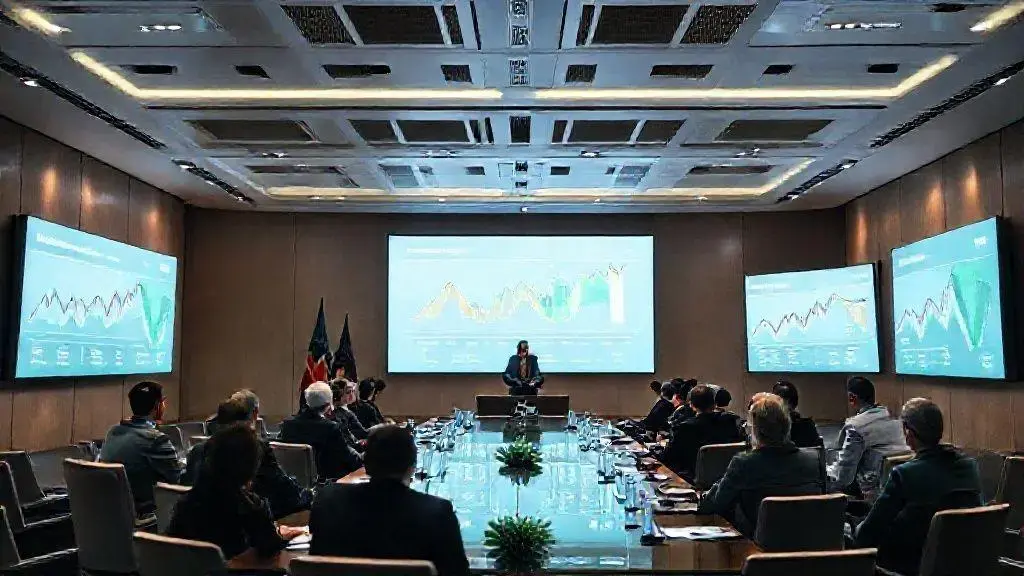Breaking news on international trade deals: what you need to know

The future outlook for international trade negotiations will be shaped by the influence of emerging economies, technological advancements, and a growing emphasis on sustainability and ethical trade practices.
Breaking news on international trade deals is shaping the way countries interact and do business globally. As these agreements evolve, they directly influence market dynamics and economic strategies. Curious about what this means for you? Let’s dive in.
Current trends in international trade agreements
International trade agreements are constantly evolving. Understanding the current trends can help businesses adapt their strategies accordingly. With various countries negotiating deals, it’s essential to stay informed about what’s happening globally.
Emerging Patterns in Trade Agreements
Many nations are focusing on bilateral and multilateral agreements to strengthen economic ties. Notably, these agreements often prioritize favorable terms for involved countries.
- Focus on sustainability and environmental standards
- Shifts towards regional trade arrangements
- Increased digital trade provisions
- Articulation of labor rights protections
As countries negotiate these terms, they aim to minimize trade barriers and enhance cooperation. Trade agreements are increasingly influenced by political climates and economic priorities. Decisions on tariffs, quotas, and regulations are significant in determining how businesses will thrive.
Impacts on Global Supply Chains
These trends also impact global supply chains. More companies are shifting towards localized supply chains to reduce risks associated with long distances.
- Rising costs of international shipping
- Supply chain disruptions due to geopolitical tensions
- Emphasis on resilience and flexibility in logistics
Adapting to these changes is crucial for organizations looking to remain competitive. Staying ahead in understanding the dynamics of international trade can lead to better decision-making.
Importance of Digital Trade
Digital trade has become a vital aspect of modern agreements. Businesses recognize the necessity to include digital provisions to foster innovation and growth.
The incorporation of digital trade allows for a smoother exchange of goods and services, spanning borders without the barriers of traditional methods. Ensuring a robust digital framework can drive further economic development.
In summary, keeping an eye on current trends in international trade agreements helps organizations strategize and adapt their operations globally. By understanding the underlying factors influencing these changes, businesses can navigate their challenges effectively.
Impact of recent trade deals on global markets

The impact of recent trade deals on global markets is significant and multifaceted. As countries forge new agreements, the economic landscape continues to change. These changes can affect everything from consumer prices to market stability.
Changes in Consumer Prices
One direct result of trade deals is the effect on consumer prices. Lower tariffs can lead to cheaper imports, which in turn can affect domestic markets. When goods are less expensive to import, consumers often benefit from lower prices.
- Increased competition among suppliers
- Variety of products available for consumers
- Potential pressure on local producers
However, not all effects are positive. Domestically produced items may struggle to compete against imported goods, which can lead to economic pressures on local businesses.
Market Stability and Growth
Trade agreements also play a crucial role in market stability. When countries establish solid trade relationships, they can create a more predictable environment for investments. Investors typically seek environments where risks are minimized.
- Boost in foreign direct investment
- Strengthened supply chains
- New opportunities for businesses to expand
With more stable markets, countries can experience significant economic growth. This growth can lead to job creation and enhanced economic opportunities for citizens.
In the context of the global market, the ramifications of these trade deals extend far beyond local economies. Nations that engage in trade agreements are often better positioned to negotiate favorable terms in future deals.
Geopolitical Considerations
The interplay between trade agreements and geopolitics is essential to understand. Economies can rise and fall based on their relationship with trading partners. Recent agreements may shift alliances and affect political dynamics.
Countries may leverage trade as a tool in international relations, showing that the implications of trade deals go beyond mere economics. Businesses need to be aware of these dynamics as they operate in an increasingly interconnected world.
Ultimately, recognizing the impact of recent trade deals on global markets is crucial for anyone involved in trade or business. Understanding these connections can empower organizations to make informed decisions amidst changing economic landscapes.
How businesses can adapt to changes in trade policies
Adapting to changes in trade policies is essential for businesses looking to thrive in a dynamic market. As governments negotiate new agreements, organizations must remain agile and prepared to adjust their strategies. Understanding the implications of these changes can help businesses stay competitive.
Assessing Impact on Operations
The first step for any business is to assess how new trade policies affect their operations. This includes analyzing tariffs, quotas, and regulations that may impact costs and logistics.
- Review current supply chain structures
- Evaluate pricing strategies for products and services
- Identify potential new markets or products
By thoroughly understanding these aspects, businesses can make informed decisions and pivot accordingly.
Enhancing Supply Chain Flexibility
Another crucial area is enhancing supply chain flexibility. As trade policies shift, being able to adapt quickly can save costs and reduce risks.
Companies might consider diversifying their suppliers or even sourcing materials from different countries. This diversification can help mitigate the risks associated with dependency on a single country or supplier.
It can also be a smart move to utilize technology for better monitoring and management. Investing in logistics software can streamline operations and provide real-time insights.
Staying Informed and Engaged
In addition, staying informed is vital in a rapidly evolving landscape. Businesses should monitor policy changes closely and understand their potential impacts. Joining industry trade groups or associations can provide valuable insights and resources.
- Participate in workshops and webinars
- Network with industry peers to share knowledge
- Engage with government officials to voice concerns
Being proactive rather than reactive can help businesses navigate changes and seize opportunities as they arise. Ultimately, understanding the new landscape of trade policies will be crucial for ongoing success.
Future outlook for international trade negotiations

The future outlook for international trade negotiations is an ever-evolving landscape that reflects global dynamics. As countries navigate complexities in their diplomatic relationships, these negotiations play a critical role in shaping economic policies.
Emerging Economies and Their Influence
Emerging economies are positioning themselves as key players in global trade. As these countries develop, their participation in trade agreements becomes increasingly vital. This shift can lead to more diverse trade partnerships.
- Increased exports from emerging markets
- New competition for established economies
- Opportunities for collaborative projects
As the influence of these nations grows, they can negotiate terms that better represent their interests, reshaping the balance of power in trade negotiations.
Technological Advancements and Innovation
Technology continues to transform how trade negotiations are conducted. Digital platforms facilitate faster communication and data sharing, allowing for more transparent discussions.
Innovation also plays a role in creating new trade opportunities, especially in sectors like e-commerce and digital goods. Organizations must adapt to these changes to thrive.
Focus on Sustainability and Ethical Trade
The global emphasis on sustainability is becoming a significant factor in future negotiations. Countries are increasingly looking to incorporate environmental and ethical standards into their trade agreements.
- Integrating climate change considerations
- Establishing fair labor practices
- Encouraging sustainable sourcing
This shift reflects a broader awareness of global challenges and the responsibility of nations to address them through trade.
Adapting to these changes requires businesses to be forward-thinking and proactive. Understanding future trends in international trade negotiations can empower organizations to align their strategies and adapt to a continuously evolving environment.
FAQ – Frequently Asked Questions about International Trade Negotiations
How can businesses prepare for changes in trade policies?
Businesses should assess their operations, enhance supply chain flexibility, and stay informed about policy changes to adapt effectively.
What are the benefits of engaging in trade agreements?
Engaging in trade agreements can provide access to new markets, reduce costs through lower tariffs, and enhance competitive advantage.
How do emerging economies impact global trade?
Emerging economies can shift the balance of power in trade negotiations, often demanding terms that better suit their interests and needs.
Why is sustainability important in trade agreements?
Sustainability ensures that trade practices consider environmental impacts and promote ethical standards, aligning with global efforts to combat climate change.





